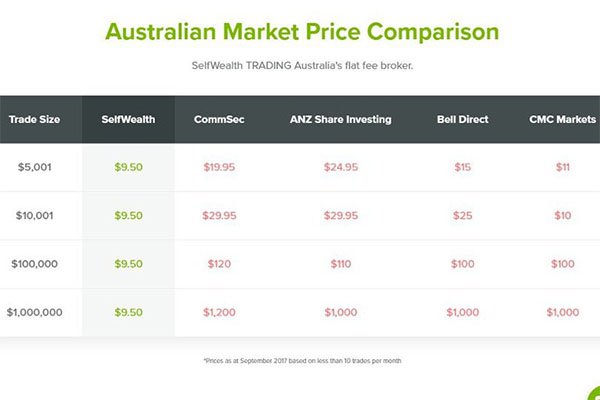Stock brokerage: why big fees are now a thing of the past
Hey! Looks like you have stumbled on the section of our website where we have archived articles from our old business model.
In 2019 the original founding team returned to run Next Investors, we changed our business model to only write about stocks we carefully research and are invested in for the long term.
The below articles were written under our previous business model. We have kept these articles online here for your reference.
Our new mission is to build a high performing ASX micro cap investment portfolio and share our research, analysis and investment strategy with our readers.
Click Here to View Latest Articles
Most experienced investors are all too aware that broker fees and commissions can eat up returns and put a tight squeeze on those hard-won profit margins.
After dabbling in buying and selling securities on the stock market, many come to see that cost control is a particularly important element of any investing you may choose to do. We all know logically that chasing a high return on your money becomes a far simpler task when you stop spending cash you simply don’t need to spend.
In fact, costs are one of the only things you have some direct control over in the investing game, since you don’t actually have a say in what markets do and what happens to a company’s share price. High investment costs are a barrier to wealth, but the good news is there are new and better ways around them which should translate into better net returns.
Crunching numbers
Looking at averages for a moment — reducing fees by just 0.38%, for example, can add 7% (or around $40,000) to the average member’s superannuation account when it comes time to retire.
While the difference may not seem significant at first (most people would shrug off 0.38%), thanks to the effects of compounding interest it can amount to a big gap in the end.
According to research house, Rainmaker, Australians paid a massive $31 billion in superannuation fees in 2016.
When you consider that managed funds charge high fees with the promise of high performance, but that the majority of all fund managers actually fail to beat the index they are tracking, you really begin to question why anyone is willingly paying these fees to have their money invested.
That has led to the modern world of investing where more and more people are taking things into their own hands and managing their own portfolios. A high proportion are using online brokers to do so, which is far more economical than a managed fund for example, yet there are fees and commissions lurking there, too.
The rapid escalation of FinTech has brought plenty of market disruption in the last five years, and we are now at a point where there are unprecedented tools available to help investors manage their own portfolios while keeping their costs exceptionally low. We now have players like Self Wealth.
SelfWealth steps onto the stage
Less than six months ago, SelfWealth Limited (ASX:SWF) listed on the ASX. The FinTech small cap is offering what the Australian Financial Review has referred to as ‘Facebook for investors’.
While that alone sounds intriguing, there’s a lot more to it than just a novel idea — the promise from the company is that there are considerable savings to be made through its unique platform.
Although it remains a speculative stock and investors should seek professional financial advice if considering this stock for their portfolio.
For starters, it charges an incredibly low flat-rate brokerage fee of $9.50 for any transaction. The below graph compares this to the rates of SWF’s major competitors, per trade size:

For the last two years SWF has offered its low-fee CHESS-sponsored online broking platform to customers, along with a unique service offering — a portfolio constructions tool and peer-to-peer portal.
Not only is it a low-cost brokering platform, but users also gain access to the community of SelfWeath members, giving the customer a unique peak at the kinds of investments being made by their peers. Going a step further, a Premium account on the platform lets users create their own Target Portfolios comprising a diversified selection of stocks based on the top weighted holdings of the 10 best performing members they choose to follow.
In a nutshell, SWF’s platform is a sophisticated peer-to-peer (or P2P) portfolio construction tool, based on real time data. So, while you save on fees, you can self-manage your portfolio with real-time (passive) assistance from SWF’s investing community.
How well is this working for SWF’s users? The company created an index of its best performing user portfolio, the SelfWealth 200 (SW200). The index, calculated by FTSE Russell, includes the top 200 holdings by weighting from the top 200 SelfWealth portfolios (rebalanced quarterly) and proved that the index beat the performance of the ASX200 by a massive 14.13% in FY2015-16.
The past performance of this product is not and should not be taken as an indication of future performance. Caution should be exercised in assessing past performance. This product, like all other financial products, is subject to market forces and unpredictable events that may adversely affect future performance.
Freeing investors from high fees: a natural evolution?
Some three million Australians have online broking accounts. Currently, the Big Four banks have 75-80% of that business through their platforms (nabtrade, CommSec and so on).
For those wanting to trade on the stock market, it used to be the norm that they would visit a broker in person or call them to make a trade. Of course, with the online revolution, that model was disrupted dramatically and the cheaper option of online brokerage became readily available.
What we are now seeing is the next wave of change to hit the world of stockbroking — and customers seem only set to benefit.
General Information Only
S3 Consortium Pty Ltd (S3, ‘we’, ‘us’, ‘our’) (CAR No. 433913) is a corporate authorised representative of LeMessurier Securities Pty Ltd (AFSL No. 296877). The information contained in this article is general information and is for informational purposes only. Any advice is general advice only. Any advice contained in this article does not constitute personal advice and S3 has not taken into consideration your personal objectives, financial situation or needs. Please seek your own independent professional advice before making any financial investment decision. Those persons acting upon information contained in this article do so entirely at their own risk.
Conflicts of Interest Notice
S3 and its associated entities may hold investments in companies featured in its articles, including through being paid in the securities of the companies we provide commentary on. We disclose the securities held in relation to a particular company that we provide commentary on. Refer to our Disclosure Policy for information on our self-imposed trading blackouts, hold conditions and de-risking (sell conditions) which seek to mitigate against any potential conflicts of interest.
Publication Notice and Disclaimer
The information contained in this article is current as at the publication date. At the time of publishing, the information contained in this article is based on sources which are available in the public domain that we consider to be reliable, and our own analysis of those sources. The views of the author may not reflect the views of the AFSL holder. Any decision by you to purchase securities in the companies featured in this article should be done so after you have sought your own independent professional advice regarding this information and made your own inquiries as to the validity of any information in this article.
Any forward-looking statements contained in this article are not guarantees or predictions of future performance, and involve known and unknown risks, uncertainties and other factors, many of which are beyond our control, and which may cause actual results or performance of companies featured to differ materially from those expressed in the statements contained in this article. S3 cannot and does not give any assurance that the results or performance expressed or implied by any forward-looking statements contained in this article will actually occur and readers are cautioned not to put undue reliance on forward-looking statements.
This article may include references to our past investing performance. Past performance is not a reliable indicator of our future investing performance.



